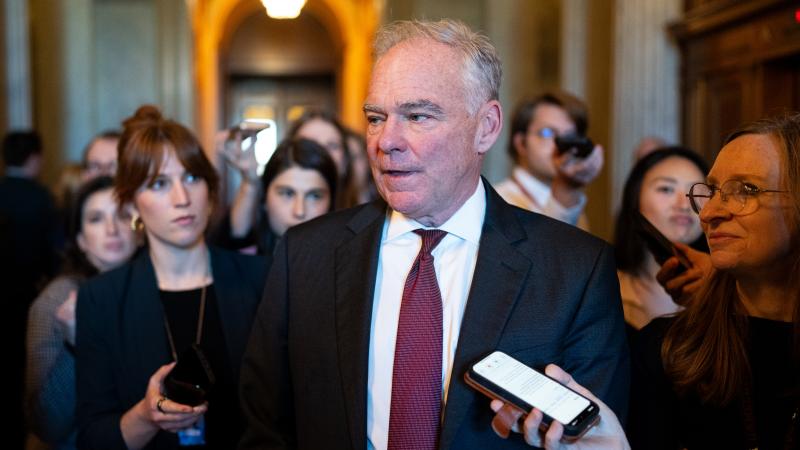Reshaping the right: A generational divide heralds a transformation of the GOP
Polling data increasingly shows a substantial divide within the Republican Party by age on some of its keynote issues and younger leaders of the conservative movement have begun to tailor their rhetoric more towards the younger bloc.
With alternative media firmly establishing itself and the Trump administration moving the public discourse in a rightward direction, Gen Z conservatives are increasingly challenging long-established norms in the GOP and appear eager to reshape the movement in an “America First” mold that surpasses the president’s own vision.
To be sure, many of these younger conservatives are supportive of President Donald Trump and his general efforts, but are increasingly pushing the Overton window to address issues that the GOP has long held taboo, such as curtailing legal immigration, questioning America's relationship with Israel, and seeking to define American identity in a concrete way.
Polling data, moreover, increasingly shows a substantial divide within the Republican Party by age on some of its keynote issues and younger leaders of the conservative movement, such as Turning Point’s Charlie Kirk, have begun to tailor their rhetoric more towards the younger bloc.
The role and impact of independent media
Speaking on the John Solomon Reports podcast this week, conservative activist and RiftTV contributor Sarah Stock attributed some of the divide to a generational split in how conservatives consume information.
“Gen Z is consuming a lot more alternative, independent media where people can talk more freely about these things,” she told Just the News. “Baby Boomers are more likely to get all their information from somewhere like Fox News, where information is just a little bit more censored and hard to get to.”
That split, she asserted, has been a driving force in leading younger conservatives to rethink some of the norms of the GOP. Here’s a look at how some of them are thinking.
Questioning legal immigration
While Trump has been a vocal critic of illegal immigration and called for mass deportations, he has largely been supportive of continued legal immigration, notably calling for a door in his border wall for people to enter the U.S. legally. He further supported the H-1B visa program over the Christmas season when incoming members of his administration publicly feuded over it.
The H-1B visa program allows U.S. employers to temporarily employ foreign workers in specialty occupations that require theoretical and practical application of a body of highly specialized knowledge and at least a bachelor's degree or its equivalent.
“I'm glad that the right is starting to talk about the problem of legal migration,” Stock said. “It's only been sort of socially acceptable to raise the alarm or talk about the problem with illegal immigration, but legal migration has been displacing American workers for years and years.”
“I know men who have gone to school for computer science, extremely smart American men who are successful, they should be able to get a job in Silicon Valley. But there's a lot of these corporations just want to replace American workers with cheap H-1B labor from, mostly from China and India, and these people that don't really have any desire to become American,” she asserted. “They're here temporarily. They're sending money back to their own countries. And really, they're here because they can be paid less and be treated worse, because a lot of times their stay is conditional on the job they keep.”
“I think that the legal status is less relevant than we make it out to be,” she went on. “And also, in some cases, legal migration is worse, because you can't deport people once you give them citizenship, at least you can't very easily.”
A February survey from Napolitan News of California voters found that while 72% believed illegal immigration is bad for the country, a staggering 87% believed that legal immigration benefits the United States. Conducted Feb. 10-12, the survey questioned 800 registered voters in California and has a margin of error of +/- 3.5%.
Pressed on that information, Stock attributed the polling disparity, in part, to pervasive narratives about the benefits of immigration, a lack of public awareness about its adverse effects, and the substantial difference in media consumption by generation.
“For the people who do see a problem with it, yeah, you're right. It's probably young people who are missing out on jobs. It's probably, I would just guess, mostly just conservatives. And yeah, I would say young Gen Z,” she added. “Gen Z conservatives have kind of woken up on this issue before the Baby Boomer generation has. Because, I mean, Gen Z is consuming a lot more alternative, independent media where people can talk more freely about these things.”
Stock is not alone in this sentiment, by any means, and prominent younger conservatives have increasingly called for a total immigration moratorium in recent weeks. “It's time to ban third world immigration, legal or illegal,” said Charlie Kirk in June. “We've reached our limit and we have a huge cultural, educational, housing, financial, and essential services problem to fix now because of it. We need a net-zero immigration moratorium with a ban on all third worlders.”
Kirk made his remarks in reply to the Daily Wire’s Matt Walsh, who said “[b]an all third world immigration. Legal or illegal. There should be a moratorium on all immigration from the Third World. We've reached our capacity. We cannot be the world's soup kitchen anymore.”
Redefining American identity
Stock originally went viral earlier this year in a segment of Jubilee’s “Surrounded” in which she carved out a view of American identity that explicitly rejected the longstanding “melting pot” narrative of the nation and highlighted the country’s European and Christian roots.
“I think I went viral because I used the phrase ‘xenophobic nationalism,’” Stock said. “I kind of threw it right back at him, because he was accusing Trump supporters of being xenophobic nationalists.”
“And what I said was that as Americans, we should all be xenophobic nationalists, in the sense that we should want to have a border, we should want to be able to maintain our culture,” she went on. “He asked me what that was, and I said, well, our culture is rooted in a European and Christian tradition, and that's, you know, obviously, that's why we speak English… So that does form the basis of what our culture is.”
“And, you know, this proved to be kind of a controversial point, because, of course, a lot of liberals, even, I would say some liberals on the right like to say that ‘America doesn't have a real culture. We're just a melting pot of a million different cultures and beliefs,’” she said.
“And I said, ‘No, I just simply don't think that's true.’ All of the founding stock were European Christians, or almost every single one of them, and so that does form the basis of what our country is, even if, you know, of course, we have people who assimilate into that, or we have or that's not every single person in the country, but we do have an identity as a nation.”
She further asserted that such a sentiment was a key factor in the success of the Trump movement, saying that even though he “might not have spelled that out directly, he still has kind of tapped into this feeling of Americans wanting to be put first and wanting to feel like we have a stake in our own country, and we want to be prioritized over foreigners.”
Foreign affairs and Israel
While Trump himself has long championed a reserved American foreign policy that opts against the regime change and intractable nation-building wars of the Bush-era GOP, he has notably been willing to keep American military personnel committed to Middle Eastern conflicts. In recent months, he has pursued limited military actions against Iran and Yemen while deploying military assets to help defend Israel in the aftermath of Israeli strikes on Iran’s nuclear facilities just weeks ago.
The matter of Israel currently represents one of the sharpest generational divides within the Republican Party. A March Pew Research Survey sent shockwaves through the media after finding that a majority of Americans held a negative view of Israel for the first time. The shift in sentiment was not limited to an uptick in pro-Palestinian college activists. The survey found that 53% of Americans overall held an unfavorable view of Israel, whereas only 42% held that stance in 2022.
Republicans, in that timeframe, shifted from 27% negative to 37% negative, with voters aged 18-49 driving that shift. In 2022, just 35% of Republicans under 50 held a negative view of Israel, but that figure rose to 50% in 2025, far exceeding the 23% negative views of Republicans over 50 years old. That block moved only 4% from the 19% negative views in 2022. Conducted March 24-30, the survey questioned 3,605 panelists and has a margin of error of +/- 1.9%.
“Of course, this is probably one of the biggest issues that there's a generational gap on in the conservative movement,” Stock said. “And I think probably a big reason why… is that young people are consuming more independent media, so they're getting access to information that older people probably aren't getting.”
“But not only that, I think that… any young person who's been invested in politics at all grew up more in the Trump era. So we're used to hearing the phrase ‘America first’, and that's kind of what we've built our conservative worldview on,” she said. “And so when we see, you know, Israel basically dragging us into this war with Iran, and we're being told we have to support them unconditionally, it's, it's kind of like, Wait, how is this America first?”
“[W]e're not seeing how these endless wars in the Middle East really benefit America. If anything, it seems to just be using our tax dollars and, you know, taking the lives of American soldiers,” Stock continued. “And just like the conservatives in the mainstream are able to say about Ukraine, it's the exact same thing when it comes to the Israeli conflict. It's just that I think that young Americans don't have the same emotional allegiance to Israel and emotional ties to Israel that the older generation does.”
Driving at least some of the generational divide is a shift among younger conservatives toward religious organizations that either do not emphasize Israel or actively reject any notion of a religious obligation toward that nation. Stock says she is a recent convert to Roman Catholicism, a faith that endorses the concept of the church as the Biblical “Israel” rather than the modern nation state bearing the name.
“I think that just young people in general right now, it's like they're either gay leftists or they're tradcaths [traditional Catholics], right? So it's like this crazy divide we're seeing. They're going to one extreme or the other,” she said. “If they're going to be religious, they're probably going to be Catholic or Orthodox, and that's just the kind of shift we're seeing right now.”
The Pew Research Survey found Catholics to be among the least supportive religious groups in the United States toward Israel. Overall, 53% of that faith’s members held a negative view of the country, while just 45% viewed it positively. By contrast, 72% of Evangelicals held a positive view of Israel while just 26% viewed the country negatively.
To account for some of the disparity, Stock again pointed to the differences in media consumption by generation, specifically pointing to pro-Israel televangelists who were prominent in prior decades.
“The televangelists were basically leading cults of personality when it came to Christianity... And they were peddling a lot of pro-Israel talking points and convincing the baby boomer generation they had to support the creation of Israel and America has to, you know, we have all these spiritual ties to Israel,” she said. “As Catholics, we don't believe that.”
“So we don't feel like there's a spiritual need for support of Israel,” she concluded.














